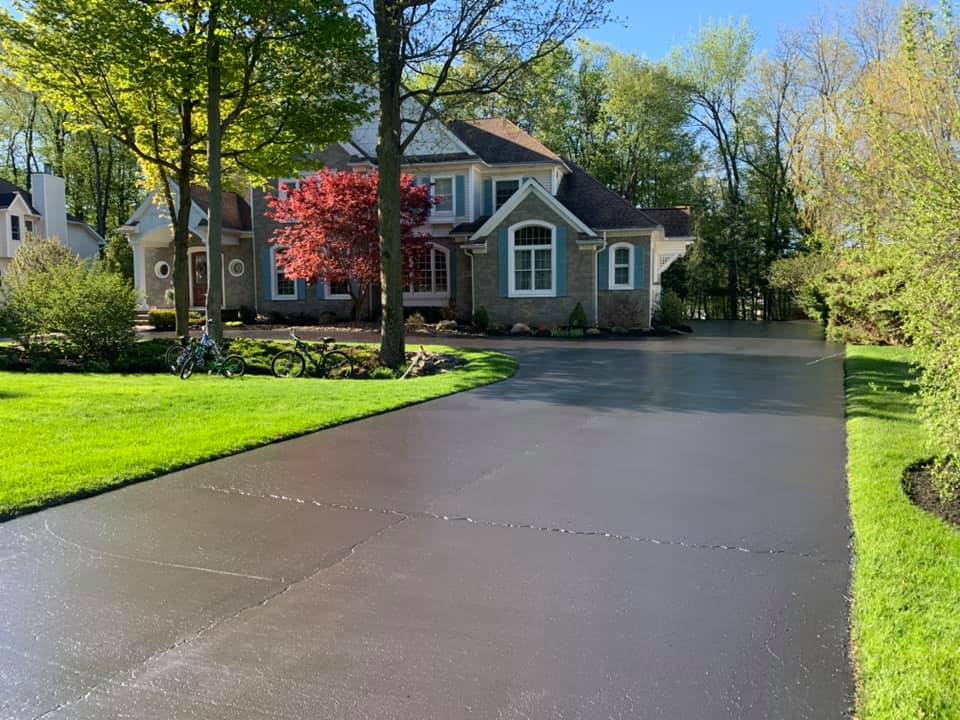Warm Mix Asphalt: A Sustainable Service for Sidewalk
Hot Mix Asphalt (HMA) has actually become a leading sustainable choice for sidewalk options, offering a myriad of ingenious modern technologies and ecological advantages. Its ability to lower and reuse products power consumption provides an engaging instance for its fostering in road building tasks. Moreover, the long-term performance and resilience of HMA make it a recommended option for facilities development. As the demand for environmentally friendly building and construction methods grows, discovering the subtleties of HMA's sustainability can supply beneficial insights right into the future of pavement services.
Environmental Advantages of Warm Mix Asphalt

In Addition, Hot Mix Asphalt helps to mitigate metropolitan warm island effects. Its dark color soaks up sunlight, lowering the amount of warm mirrored back into the ambience contrasted to lighter-colored sidewalks. This can reduce ambient temperatures in metropolitan areas, reducing the demand for a/c and eventually lowering power consumption.
Furthermore, Hot Mix Asphalt adds to improved stormwater management. Its porous nature allows water to reenergize and infiltrate the pavement groundwater products, minimizing drainage and the danger of flooding. These ecological advantages make Warm Mix Asphalt a sustainable choice for paving highways and roads.
Power Effectiveness in HMA Manufacturing
Is energy effectiveness an essential consider the manufacturing of Warm Mix Asphalt (HMA)? Definitely. Power plays a significant role in the manufacturing of HMA, affecting both cost and environmental sustainability. One essential aspect of power efficiency in HMA manufacturing is using cozy mix asphalt (WMA) modern technologies (angled parking). WMA permits the blending and positioning of asphalt at reduced temperatures contrasted to typical warm mix asphalt, causing lowered energy consumption throughout production. This procedure not just decreases gas use yet likewise reduces greenhouse gas exhausts, making it a much more eco-friendly alternative.
Additionally, innovations in plant modern technologies have led to even more energy-efficient HMA production procedures. By optimizing energy use in HMA production, the sector can lower its carbon impact while keeping top quality pavement materials.
Recyclability of Hot Mix Asphalt
The recyclability of Warm Mix Asphalt (HMA) is a critical element of its sustainability and long-term ecological effect. HMA is among one of the my site most recycled materials in the USA, with over 100 million bunches of redeemed asphalt sidewalk (RAP) being reused yearly in brand-new pavement construction. Recycling HMA supplies several ecological advantages, such as reducing the demand for virgin materials, reducing power intake during manufacturing, and lowering the quantity of more waste sent out to garbage dumps.
The procedure of reusing HMA includes milling the existing pavement, crushing it into smaller items, and mixing it with new accumulation and asphalt binder to develop a recycled mix. In general, the recyclability of HMA plays a considerable function in advertising sustainable practices within the sidewalk industry.

Long-Term Efficiency of HMA
Asphalt sidewalks demonstrate durability and durability over an extensive period, reflecting the long-term efficiency of Hot Mix Asphalt (HMA) In addition, developments in HMA modern technology, such as the usage of polymer-modified binders and cozy mix asphalt, have even more boosted the resilience and long life of HMA pavements. By focusing on quality construction and maintenance techniques, HMA continues to show itself as a lasting and economical remedy for long-lasting pavement framework.

HMA: Toughness and Sustainability
Showing both longevity and sustainability, Hot Mix Asphalt (HMA) has become a cornerstone in the construction of lasting sidewalk infrastructures - angled parking. HMA's durability comes from its capability to hold up against heavy tons, severe climate problems, and high website traffic volumes, making it a reliable choice for roadways, freeways, and airport runways. The composition of HMA, which normally includes accumulations, binder, and filler, plays a critical duty in improving its longevity and resistance to tear and use
Furthermore, HMA's sustainability depends on its recyclability and energy-efficient production procedure. The capability to reuse reclaimed asphalt pavement (RAP) in new HMA blends reduces the need for virgin materials and minimizes the environmental effect of pavement construction and upkeep. Additionally, the energy efficiency of producing HMA hinges on its lower blending temperatures compared to various other sidewalk products, causing lowered power consumption and greenhouse gas top article exhausts.
Conclusion
In conclusion, warm mix asphalt (HMA) offers a lasting service for sidewalk with its environmentally friendly attributes. HMA's recyclability, energy effectiveness in manufacturing, and long-lasting toughness make it an environmentally friendly option for roadway construction. By preserving natural sources, decreasing waste, and decreasing greenhouse gas emissions, HMA plays an important duty in promoting sustainability in facilities development. Its capacity to minimize urban warm island effects further underscores its importance in creating environmentally mindful and resistant sidewalk systems.
HMA is one of the most recycled products in the United States, with over 100 million loads of redeemed asphalt pavement (RAP) being reused annually in new pavement building.The procedure of recycling HMA involves grating the existing pavement, squashing it into smaller sized pieces, and blending it with new accumulation and asphalt binder to produce a recycled mix.Asphalt pavements show toughness and resilience over an extensive period, showing the lasting efficiency of Warm Mix Asphalt (HMA) Additionally, improvements in HMA modern technology, such as the usage of polymer-modified binders and cozy mix asphalt, have actually even more improved the resilience and longevity of HMA sidewalks. The capacity to recycle redeemed asphalt sidewalk (RAP) in new HMA mixes minimizes the need for virgin materials and minimizes the ecological influence of pavement building and maintenance.